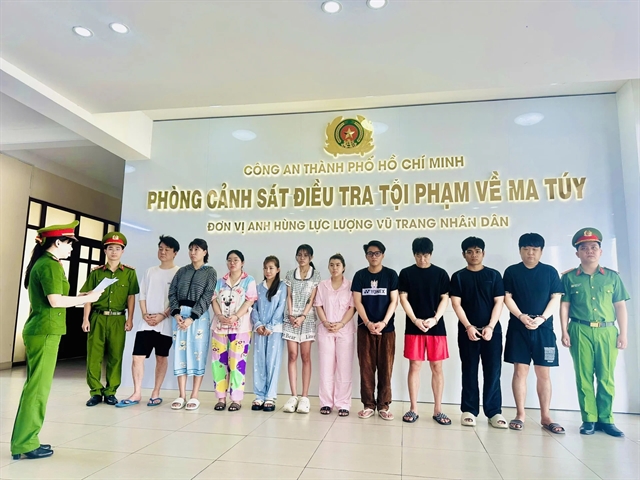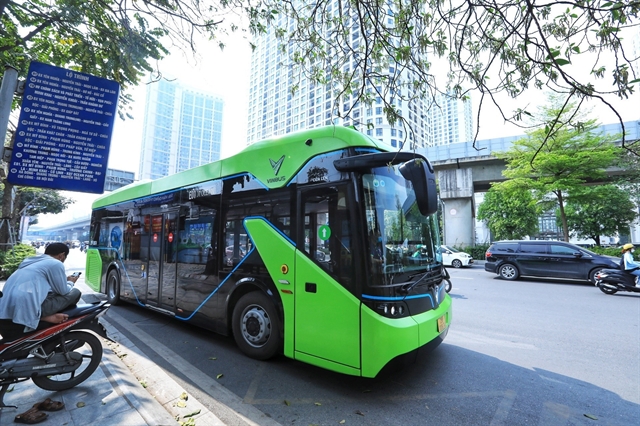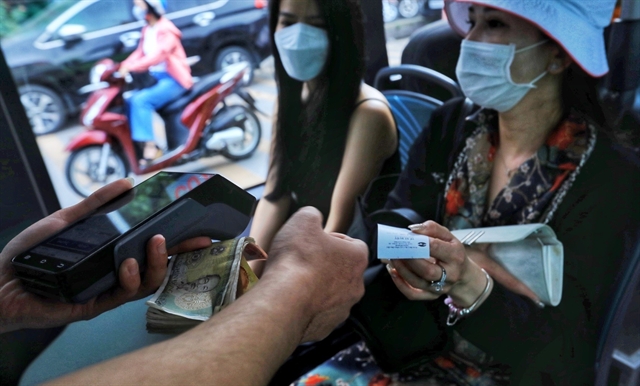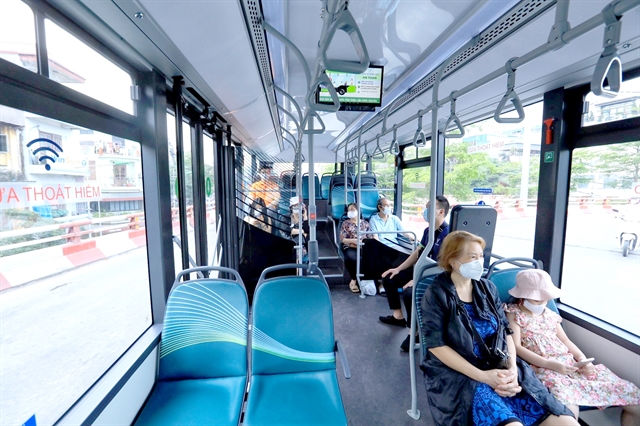 Society
Society


|
| An electric bus at a bus stop on Nguyễn Trãi street in Hà Nội. VNA/VNS Photo Tuấn Anh |
HÀ NỘI – Regarding Hà Nội's proposal to increase bus ticket prices from early 2024, many experts have argued that this is necessary to reduce subsidies from the city's budget, while affirming that the proposed increases are still in line with the payment ability of the residents.
The city’s Department of Transport has proposed to increase bus fares starting January 1, 2024.
As per the proposal, the single ticket price for trips shorter than 15 kilometres would rise from VNĐ7,000 (US$0.28) to VNĐ8,000 ($0.32).
For distances between 15 and 25 kilometres, the fare would increase from VNĐ7,000 ($0.28) to VNĐ10,000 ($0.4). Longer trips covering 30 to 40 kilometres would see ticket prices soaring from VNĐ9,000 ($0.36) to VNĐ15,000 ($0.6).
The highest increase, from VNĐ9,000 ($0.36) to VNĐ20,000 ($0.8), would apply to trips over 40 kilometres. Monthly ticket fares will also see an average increase of 40 per cent.

|
| Passengers buy tickets while travelling on a bus in Hà Nội. Bus fares will rise from early 2024. VNA/VNS Photo Tuấn Anh |
Explaining the proposed increase of bus fares, Nguyễn Phi Thường, Director of the city's Department of Transport stated that bus fares have remained unchanged since 2014 and are very low.
Meanwhile, the cost of operating buses has increased by nearly 50 per cent compared to 2014. Specifically, the average cost of operating three regular buses is VNĐ21,080 per kilometre, equivalent to a 46.95 per cent increase compared to 2014. The operating cost of electric buses is VNĐ27,929 per kilometre, a 62 per cent increase over regular buses in 2014; and that of CNG buses is VNĐ21,821 per kilometre, a 48.6 per cent increase over regular buses in 2014.
Additionally, recent surveys found that the maximum expenditure for travelling needs accounted for about 10 per cent of total spending. Therefore, the monthly spending for travelling needs of the city residents would be more than VNĐ800,000 ($32) on average, making the bus fare increase appropriate and not significantly affecting the income of the residents, he said.
In case of maintaining the bus fares, the city's budget would face considerable challenges in efforts of cutting subsidises for investing in clean energy vehicle renewal and service quality improvement.
Thường said the department had assessed the impact of raising bus fares. The number of passengers, especially occasional riders, might decrease slightly, but revenue from rising fares would increase.
"Therefore, applying bus fares from 2014 is no longer appropriate. Increasing bus fares will help boost revenue, reduce subsidies, and ensure the city's budget remains balanced," he emphasised.
Affordable prices
Nguyễn Trọng Thông, Chairman of the Hà Nội Public Passenger Transportation Association, said after many times of increasing fares, he realised people were more focused on the convenience of this mode of transportation.
"The current fare prices have not been adjusted since 2014 while input factors such as fuel and labour costs have increased significantly. If the city's budget cannot bear the additional burden, then raising fares becomes a necessary step to compensate," he stated.

|
| Passengers focus more on service quality than fares when using buses. VNA/VNS Photo Tuấn Anh |
Thông also emphasised the need to increase fares so that the cost of commuting did not exceed 10 per cent of people's income.
Phan Lê Bình, a transportation expert, shared the same opinion, noting that most people would accept the fare increase because there was no public transportation mode as affordable as buses.
He said the increase level was modest and remained the cheapest compared to other forms of transportation, making it acceptable.
Bình said Hà Nội might have considered a fare increase in 2020, but due to the COVID-19 pandemic, the government agencies couldn't implement it.
Nguyễn Thị Thu Thủy, a lecturer at the University of Transport and Communications, assessed that the quality of public transportation services in Hà Nội was better than in other provinces. Currently, in Hà Nội, a monthly bus pass cost VNĐ200,000 ($8) while in some neighbouring provinces, monthly prices could range from VNĐ300,000-400,000 ($12-16).
"Sitting on a bus during peak hours isn't much different from a taxi, but it's much cheaper, so this fare increase is acceptable,” she said.
To attract more passengers, Thông suggested that the city should ensure convenient access, increase bus speed, and ensure punctuality, including having dedicated bus lanes (like BRT) enforced with solid barriers made of flexible materials and penalties for traffic violations.
"Public transportation with lower speeds than motorcycles is a complete failure and is unlikely to convince people to choose the bus, leading to increased traffic congestion due to more personal vehicles," he said. – VNS